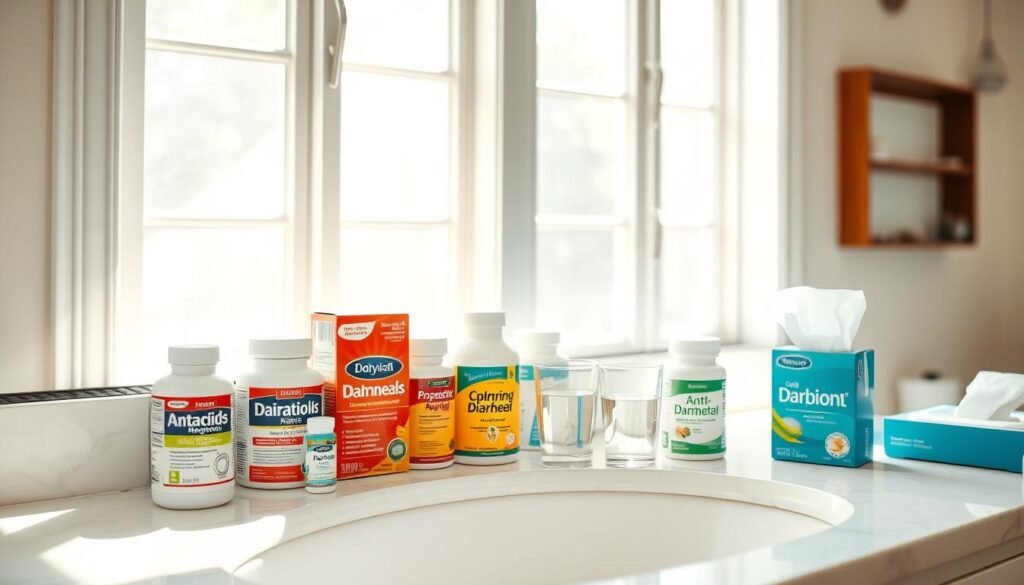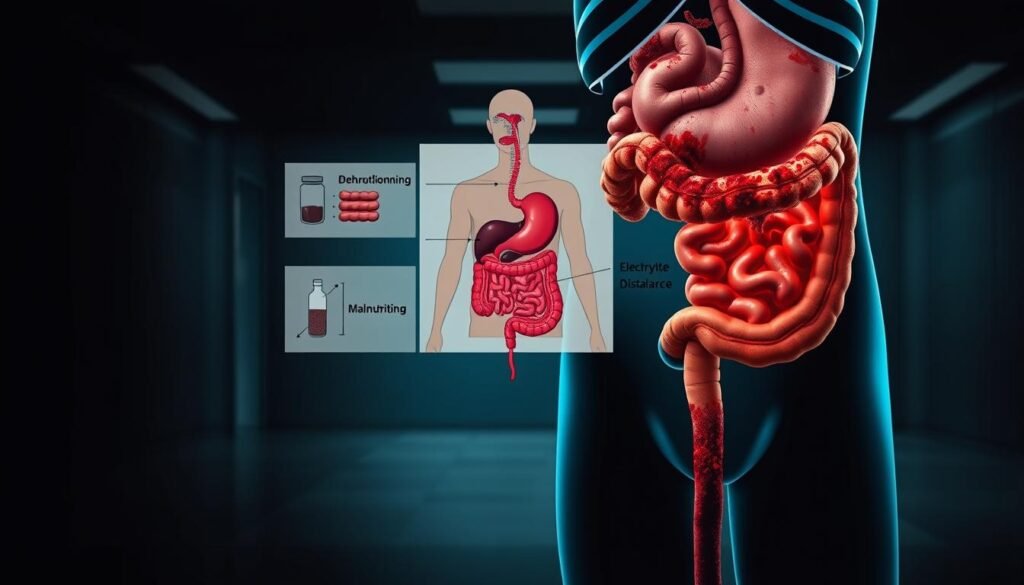Could your morning routine be hurting your gut? For millions, waking up with digestive issues is more than a hassle—it’s a warning sign. Studies reveal 1 in 5 adults face urgent bowel movements in the morning, but many think it’s just normal.
If you’ve been asking yourself, “why do I have diarrhea every morning?”—you’re not alone. Your body’s natural cycles affect your gut more than you might realize. The gastrocolic reflex, triggered by waking and eating, can cause problems if your gut is sensitive. Things like irritable bowel syndrome (IBS) and late-night snacks can be the main culprits, but the real cause might be right in front of you.
Stress hormones rise in the morning, making your gut more active. Add in typical breakfast foods or medication routines, and you’re set for discomfort. But the good news is that small changes each day can lead to lasting relief.

Key Takeaways
- Morning digestive issues affect 20% of adults nationwide
- IBS, dietary habits, and stress responses are primary triggers
- Circadian rhythms influence gut activity at sunrise
- Chronic symptoms shouldn’t be considered normal
- Lifestyle changes often provide significant improvement
Introduction: Why Do I Have Diarrhea Every Morning?
Morning diarrhea isn’t just a hassle—it’s a sign something’s wrong. Everyday morning episodes often mean there’s a specific reason. This reason could be linked to your sleep or how your gut works.
Nearly 38% of people with irritable bowel syndrome (IBS) have symptoms in the morning. This makes it a common but not well-understood problem.
Your digestive system gets busier when you wake up. This is because of the gastrocolic reflex. It’s a natural process that makes you go to the bathroom.
For some, this reflex is too strong. It leads to urgent diarrhea. Stress hormones like cortisol, which are highest in the morning, and eating too late at night can make it worse.
| Type | Duration | Common Triggers | When to Investigate |
|---|---|---|---|
| Temporary Morning Diarrhea | 1-3 Days | Food poisoning, viral infections | If accompanied by fever |
| Chronic Morning Diarrhea | 4+ Weeks | IBS, food intolerances, anxiety | Unexplained weight loss or blood in stool |
Waking up with diarrhea often means your meals and sleep don’t match. Eating spicy or fatty foods late at night can upset your gut. Caffeine on an empty stomach can wake up your brain and colon too.
This part talks about why morning diarrhea happens. Later, we’ll look at how to fix it. First, it’s important to notice patterns like when it happens, how it looks, and what else you feel.
What Is Morning Diarrhea and Why It Happens
If mornings make you rush to the bathroom, it might be your body’s natural rhythm. Morning diarrhea is when you have loose, watery stools right after waking. Let’s look at how digestion works and why mornings are tough for your gut.
Understanding Normal Digestion and Bowel Movements
Your digestive system has a daily pattern set by circadian rhythms. At night, it slows down so you can sleep. When you wake, hormones like cortisol increase to get you ready for the day.
This hormone surge makes your colon work harder. It’s part of the gastrocolic reflex that moves waste toward the rectum.
Everyone’s bowel movements are different. The Bristol Stool Chart shows stool types from hard lumps to liquid. Most people have stools that are sausage-shaped with cracks or smooth surfaces.
What Is Diarrhea?
Diarrhea is when you have loose, unformed stools three or more times a day. It happens when your intestines don’t absorb enough water or move waste too fast. Morning diarrhea often falls into two types:
- Acute: Lasts 1-2 days (often from infections or food reactions)
- Chronic: Goes on for weeks or months (linked to conditions like IBS)
Why It Strikes in the Morning
Three main reasons make mornings a bad time for diarrhea:
- The gastrocolic reflex overdrive: An exaggerated response to waking stimuli pushes waste too forcefully
- Cortisol surges: This stress hormone peaks around 8 AM, increasing gut sensitivity
- Overnight buildup: Food or drinks from the previous evening reach the colon
For some, this mix creates a “perfect storm” that makes them rush to the bathroom. The good news is knowing these triggers helps you take control.
Causes of Morning Diarrhea: From Diet to Disease
Waking up to urgent bowel movements isn’t just inconvenient—it’s your body signaling something’s off. Research shows 65% of morning diarrhea cases connect directly to food choices, habits, or stress levels. Let’s break down the most common triggers and how they disrupt your digestive rhythm.
Dietary Triggers Like Caffeine, Alcohol, and High-Fat Foods
Your morning coffee might kickstart your day and your intestines. Caffeine stimulates the gastrocolic reflex, speeding up colon activity. Alcohol from the night before irritates the gut lining, leading to “alcohol morning diarrhea.” High-fat breakfasts like bacon or fried eggs can overwhelm digestion, causing watery stools.
Food Intolerances: Lactose and Gluten
If dairy or bread leaves you rushing to the bathroom, you might have an intolerance. Lactose (in milk) and gluten (in wheat) are common culprits. These substances trigger inflammation in sensitive individuals, resulting in cramps and diarrhea within hours of consumption.
| Trigger | How It Affects Digestion | Prevention Tips |
|---|---|---|
| Caffeine | Activates colon contractions | Limit to 1 cup or switch to decaf |
| Alcohol | Damages gut lining, causes dehydration | Avoid drinking 4 hours before bed |
| Spicy Foods | Irritates stomach lining | Skip nightshades like chili peppers |
| High-FODMAP Foods | Ferments in the gut, causing gas | Try low-FODMAP veggies like carrots |
Eating Habits: Late-Night Meals and Spicy Foods
Eating after 8 PM gives your gut less time to process food before sleep. Spicy dishes containing capsaicin can irritate your intestines overnight, leading to morning urgency. Large portions or greasy takeout meals are specially bad.
Stress and Anxiety: The Gut-Brain Connection
Ever felt “butterflies” before a big event? Chronic stress amplifies this effect. Anxiety increases cortisol levels, which disrupts gut motility and fluid balance. This “stress diarrhea” often peaks in the morning when cortisol naturally rises.
Types of Morning Diarrhea and What They Mean
Not all morning diarrhea is the same. The color, texture, and consistency of your stool can tell you a lot. Let’s look at the three main types and what might be causing them.
Watery Diarrhea
If you have watery diarrhea in the morning, it might mean your intestines are moving fast. Common reasons include:
- Viral infections like norovirus
- Food poisoning from bacteria
- Lactose intolerance reactions
This usually goes away in 1-2 days. But if it lasts longer, it could mean parasites or chronic conditions like IBS.
Fatty or Oily Diarrhea
Stools that are greasy and float, leaving an oily residue (oily stool morning), show poor nutrient absorption. Possible causes are:
- Pancreatic enzyme deficiencies
- Celiac disease damaging intestinal lining
- Gallbladder dysfunction
These stools are pale and smell bad. They can also lead to unintended weight loss. This is a sign to see a doctor.
Inflammatory Diarrhea
Blood or mucus in your morning stools means inflammation. This is often linked to:
- Ulcerative colitis flare-ups
- Crohn’s disease activity
- Severe bacterial infections
Fever usually comes with this type. It’s important to see a doctor right away to avoid serious problems.
| Type | Key Features | Common Causes | Action Steps |
|---|---|---|---|
| Watery | Liquid consistency, urgent bowel movements | Infections, food intolerance | Hydrate + monitor duration |
| Fatty/Oily | Greasy texture, pale color | Malabsorption issues | Test for enzyme deficiencies |
| Inflammatory | Blood/mucus present | IBD, infections | Seek immediate care |
Symptoms That May Accompany Morning Diarrhea
Do you often have diarrhea in the morning? Look out for these symptoms that often come with it. Some are just minor issues, but others might mean you need to see a doctor.
Urgency, Cramps, and Nausea
Many feel a sudden “gut punch” feeling in the morning. This is because your colon works harder then. You might also feel nauseous, which can be caused by stress or food allergies.
Blood in Stool and Unintended Weight Loss
Seeing blood in morning stool is a big warning sign. It could mean you have hemorrhoids or something more serious. If you’re losing weight without trying, it’s also a sign to see a doctor.
Dehydration is a risk if diarrhea lasts over 24 hours. Look out for:
- Dry mouth or excessive thirst
- Dizziness when standing
- Urine darker than pale yellow
Fatigue, Dehydration, and Skin Irritation
Diarrhea can make you very tired and lose important salts. This can make you feel weak. Also, wiping too much can irritate your skin. Use gentle cleaners or moisturizers to help.
If you have two or more of these symptoms, it’s a warning. Keep a symptom journal to help your doctor find what’s wrong.
When to See a Doctor for Morning Diarrhea

Occasional morning diarrhea might go away by itself. But if it keeps coming back, it could mean there’s a bigger problem. Catching these signs early can stop bigger issues and help find the right treatment.
Warning Signs You Should Not Ignore
Don’t ignore morning diarrhea if it lasts more than two weeks. Look out for these signs:
- Blood or mucus in your stool (even small amounts)
- A fever above 101°F (38.3°C) lasting more than 24 hours
- Unintended weight loss of 5+ pounds in a week
- Severe dehydration signs: dizziness, dry mouth, or reduced urination
- Persistent abdominal pain that disrupts daily activities
What to Expect During Medical Diagnosis
Doctors follow a careful plan to find out why you have chronic morning diarrhea. The American Gastroenterological Association says to get tested if symptoms last more than 14 days.
| Diagnostic Step | Purpose | Examples |
|---|---|---|
| Medical History Review | Identify patterns or triggers | Diet habits, stress levels, family history |
| Physical Exam | Check for physical abnormalities | Abdominal tenderness, skin changes |
| Lab Tests | Detect infections or inflammation | Stool analysis, blood work |
| Imaging Scans | Visualize digestive organs | Colonoscopy, abdominal ultrasound |
Your doctor might ask you to keep a symptom diary for 1-2 weeks. Write down how often you go to the bathroom, what you eat, and how stressed you are. This information helps your doctor find the cause faster.
How Doctors Diagnose Morning Diarrhea
Doctors use a detailed process to figure out morning diarrhea. They look at your history and use special tests. This helps find out if it’s a short-term problem or a long-term issue.
Medical History and Symptom Tracking
Your doctor will ask about your bowel habits, diet, and stress. They might use the Rome IV criteria for IBS. You’ll talk about:
- How often and what your morning stools are like
- Any recent changes in your diet or eating habits at night
- Things that stress you out
Keeping a symptom diary for 2-4 weeks is helpful. Write down what you eat, how well you sleep, and how urgent your bowel movements are. This diary can show if it’s food issues, infections, or chronic gut problems.
Lab Tests and Imaging Scans
If there are signs of deeper issues, your doctor might do:
- Stool tests: Look for infections, blood, or inflammation like fecal calprotectin (common in IBD)
- Blood work: Check for celiac disease, thyroid issues, or nutrient shortages
- Hydrogen breath tests: Find out if you have lactose intolerance or too many bacteria
For ongoing problems, they might use scans like colonoscopies or CT enterography. These help find inflammation, tumors, or other problems in your gut. The results help decide how to treat you, like changing your diet or managing Crohn’s disease.
Effective Treatments for Morning Diarrhea

If you wake up to urgent bowel movements, there are proven ways to help. Treatments aim to control symptoms, heal the gut, and prevent dehydration. We’ll look at solutions for both occasional and chronic issues.
Over-the-Counter Solutions
Imodium (loperamide) slows down your gut, helping your body absorb fluids better. It starts working in 1 hour and lasts up to 24 hours. Pepto-Bismol can help with traveler’s diarrhea by reducing inflammation and killing bacteria.
Use these for quick relief. But don’t mix them with antacids. Always check for any drug interactions.
Prescription Medications for Chronic Cases
For long-term issues, doctors might suggest Humira. It targets inflammation in Crohn’s disease or ulcerative colitis. Antibiotics and anti-parasitic drugs treat infections.
For IBS, eluxadoline can calm your digestive nerves. Treatment often includes medication and dietary changes.
Probiotics and Gut Health
Probiotics can help balance your gut’s microbiome:
- Lactobacillus rhamnosus GG shortens diarrhea
- Saccharomyces boulardii stops diarrhea from antibiotics
- Multi-strain probiotics boost digestive health
Eating fermented foods like kefir and kimchi adds probiotics. Supplements should be taken daily for 4 weeks.
Hydration: Replacing Lost Electrolytes
The WHO suggests a mix for oral rehydration:
- 1 liter clean water
- 6 teaspoons sugar
- ½ teaspoon salt
Electrolyte drinks like Pedialyte have balanced sodium and potassium. Drink small amounts all day. Coconut water is a natural option without artificial sweeteners.
Dietary Adjustments That Help Prevent Morning Diarrhea
What you eat and when you eat it is key to managing morning digestive issues. Choosing the right foods can soothe your stomach and help you feel better. Let’s look at some eating tips backed by science.
Elimination and Low-FODMAP Diets
Think you might have food sensitivities? A two-step plan from Monash University researchers can help:
- Phase 1: Remove common culprits (dairy, gluten, high-FODMAP foods) for 2-4 weeks
- Phase 2: Slowly add foods back to find what bothers you
| Low-FODMAP Breakfast Options | High-FODMAP Foods to Avoid |
|---|---|
| Oatmeal with banana (1/2 medium) | Apples or pears |
| Eggs with spinach | Wheat-based cereals |
| Lactose-free yogurt | Honey or agave syrup |
Safe Foods During Flare-Ups
When you’re hit with symptoms, try these gentle options for your best breakfast for morning diarrhea:
- BRAT diet upgrades: Add scrambled eggs to toast, mix applesauce into rice cereal
- Hydration heroes: Coconut water (4 oz), peppermint tea
- Easy proteins: Boiled chicken, tofu scramble
Eat smaller meals every 2-3 hours instead of one big meal in the morning.
Foods to Avoid in the Morning
These foods often make morning diarrhea worse:
- Caffeinated drinks: Coffee makes your gut move fast within 20 minutes
- Greasy foods: Bacon and fried eggs slow down digestion
- Sugar alcohols: In protein bars and sugar-free gum
Keep a food diary for 1 week to find out what makes you sick. Watch for symptoms 2-4 hours after eating to spot patterns.
Managing Stress to Improve Gut Health

Ever felt your stomach churn before a big presentation? Or noticed urgent bathroom trips during stressful times? This is the gut-brain connection at work. Stress doesn’t just mess with your mood—it can also cause morning diarrhea by changing how your body digests food. Studies show that managing stress well can help 40% of people, as found in an APA study on mindfulness.
Simple Stress Relief Techniques You Can Try
Small daily habits can calm your nervous system and help with anxiety diarrhea. Here are some science-backed methods:
- Deep breathing: Inhale for 4 seconds, hold for 7, exhale for 8. This helps slow down your gut.
- Morning meditation: Spend 10 minutes on your breath or a calming mantra before breakfast.
- Gentle yoga: Poses like Child’s Pose or Cat-Cow can ease stomach tension and help digestion.
How Stress Impacts the Gut
When stressed, your body releases cortisol and adrenaline. These hormones:
| Stress Response | Healthy Gut Function |
|---|---|
| Speeds up intestinal motility | Maintains regular digestion rhythm |
| Weakens gut lining protection | Filters toxins effectively |
| Triggers inflammation | Supports immune balance |
This is why chronic stress often causes watery stools or urgency in the morning. By tackling stress with mindfulness, you can help your gut work better and reduce problems.
Lifestyle Changes That Can Make a Difference
If morning diarrhea messes up your day, small changes can help a lot. We’ll look at three easy ways to tackle issues like irregular schedules, bad sleep, and substance use.
Establishing Regular Meal Times
Your gut likes routine. Eating at the same times every day helps your body’s internal clock. Here’s a simple schedule:
- Breakfast: 7:00–8:00 AM
- Lunch: 12:00–1:00 PM
- Dinner: 6:00–7:00 PM
Stay away from snacks at night. Your body digests food slower after dark. This helps your gut get into a regular rhythm.
Improving Sleep Hygiene
Bad sleep can upset your gut. Aim for 7–9 hours of sleep each night. Your sleep position for diarrhea is important too. Sleeping on your left side can help digestion.
Other tips include:
- Keep screens out of the bedroom
- Set room temperature to 65–68°F
- Practice deep breathing before bed
Avoiding Alcohol and Smoking
That late-night drink might be causing your alcohol and morning diarrhea problem. Alcohol can upset your gut and make you go to the bathroom more. Smoking is even worse because nicotine makes your colon move faster.
Quitting smoking can really help. The CDC says 72% of people see their gut motility improve in just 3 weeks. Try drinking herbal tea or going for short walks after meals instead.
Potential Complications of Untreated Morning Diarrhea

Ignoring morning diarrhea can cause serious health problems. These issues go beyond just stomach pain. They can upset your body’s balance and affect your daily life.
Chronic Dehydration and Electrolyte Imbalance
Loose stools take away important fluids and minerals. Johns Hopkins found 42% of people with long-term morning diarrhea have low potassium. Look out for these signs:
- Dark urine or fewer trips to the bathroom
- Dizziness when standing up
- Muscle cramps in your legs
Electrolyte imbalances can lead to heart rhythm problems. Drinking oral rehydration solutions helps. But, if symptoms last long, you need to see a doctor.
Nutrient Deficiencies and Fatigue
Your body has trouble getting nutrients when you have diarrhea often. This can cause:
- Iron deficiency anemia (pale skin, shortness of breath)
- Vitamin B12 shortages (tingling hands/feet)
- Zinc depletion (slow wound healing)
Feeling tired all the time is common. A study showed 68% of people with dangers of chronic diarrhea have trouble working because they’re so tired.
Quality of Life and Social Impacts
Having to rush to the bathroom in the morning can make you anxious. This anxiety affects your daily life. Studies show:
- 42% arrive late to work weekly
- 31% avoid social events
- 27% have sleep problems
The stress of unpredictable symptoms can hurt your relationships and job chances. Many feel lonely. But, there are treatments that can help.
Conclusion: Getting Relief from Morning Diarrhea
Morning diarrhea can mess up your day. But, there are ways to fix it. Keeping a symptom journal for 2-4 weeks can help 68% of people find what causes their diarrhea. This can be diet, stress, or sleep issues, says Mayo Clinic.
Then, talk to a gastroenterologist at places like Cleveland Clinic or Johns Hopkins Medicine. They can give you a plan that works just for you.
Fixing diarrhea often means changing what you eat and taking certain medicines. Eating less FODMAP foods helps 75% of people with IBS. Probiotics like Culturelle or Align also help your gut.
For long-term problems like Crohn’s disease, medicines like Humira can help. They work in over 60% of cases, says specialists.
Drink lots of water, but make it electrolyte-rich like Pedialyte or Liquid IV. The American Gastroenterological Association suggests apps like Calm or Headspace for stress. These apps can lower stress by 25% in anxious people.
Try not to eat late at night or drink alcohol. It makes diarrhea worse in the morning.
If diarrhea lasts more than two weeks, get checked out. Early treatment can stop 90% of problems from diseases like celiac. The ACG Patient Care Center can connect you with GI doctors. They use the latest tests and treatments to cure morning diarrhea.
FAQ
How is morning diarrhea different from regular diarrhea?
Morning diarrhea happens when you wake up. It’s caused by a strong reflex and a hormone called cortisol. This is different from regular diarrhea, which 38% of IBS patients experience more in the morning.
Does alcohol cause diarrhea the next morning?
Yes. Drinking alcohol, especially at night, can irritate your intestines and trigger loose stools when you wake up.
Can pregnancy lead to morning digestive issues?
Pregnancy hormones may loosen your bowel movements. If it happens regularly, it’s worth discussing with your doctor.
Why does coffee upset my stomach in the morning?
Coffee stimulates your colon and can speed up bowel activity, especially in sensitive individuals.
Is it normal to have diarrhea before breakfast?
Yes, for some people. The gut can react to hormones and stress even before eating anything.
Absolutely. Morning anxiety or pressure before work can trigger the gut-brain connection and cause diarrhea.
Are breakfast foods causing my symptoms?
Possibly. Dairy, greasy meals, and sweeteners may irritate the digestive system and cause symptoms soon after eating.
Should I worry about loose stools during pregnancy?
Occasional loose stools are common during pregnancy due to hormonal changes, but frequent diarrhea needs medical advice.
Can eating late at night cause morning diarrhea?
Yes. A 2023 study found that eating late can cause morning diarrhea. Foods like garlic or onions can ferment and cause gas and discomfort in the morning.
What does watery vs fatty morning stool indicate?
Watery stools might mean you have an infection or IBS. Fatty stools could be a sign of a problem with your pancreas or how you absorb bile. If your stool has blood, it’s very important to see a doctor right away.
When should I worry about colorectal cancer?
You should get tested if you have morning diarrhea with blood, lose a lot of weight, or have symptoms for more than two weeks. If you feel a strong urge to go to the bathroom in the morning and your stools are very thin, you should also get tested.
How effective are elimination diets?
A diet low in FODMAPs can help 76% of people with IBS morning diarrhea. Start by avoiding foods like apples and beans for a few weeks. Then, slowly add them back to see how your body reacts.
Can stress management really help?
Yes. Studies show that stress can make diarrhea worse. But, meditation can help. Just 10 minutes of deep breathing in the morning can make a big difference.
What OTC medications work fastest?
Loperamide (Imodium) works fast to stop diarrhea. But, it’s important not to ignore other symptoms. Bismuth subsalicylate (Pepto-Bismol) can help with inflammation and kill bacteria. For long-term problems, your doctor might prescribe a biologic like Humira.
How do I prevent dehydration?
To avoid dehydration, drink an oral rehydration solution. It should have the right amount of sodium, potassium, and glucose. If you lose too much weight in the morning, you need to see a doctor.
Could nicotine withdrawal cause morning issues?
Yes. Quitting nicotine can lead to diarrhea in the morning. To avoid this, stop gradually and eat more fiber. Foods like oats are good sources.
What tests diagnose chronic morning diarrhea?
Doctors use several tests to find the cause of chronic diarrhea. They might check for IBS, inflammation, or intolerances. It’s also important to collect a stool sample in the morning for accurate testing.

